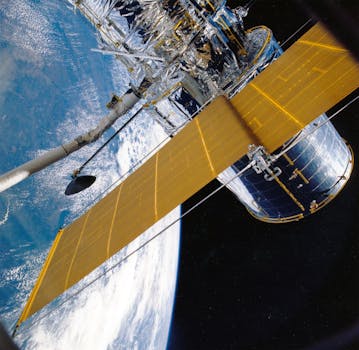The Future of Satellites: Revolutionizing Global Communication and Exploration
The future of satellites is poised to revolutionize global communication, exploration, and our understanding of the universe. With advancements in technology, satellites are becoming more efficient, cost-effective, and accessible, enabling new applications and services that transform industries and improve lives.

The future of satellites is poised to revolutionize global communication, exploration, and our understanding of the universe. With advancements in technology, satellites are becoming more efficient, cost-effective, and accessible, enabling new applications and services that transform industries and improve lives. The future of satellites holds tremendous promise, and it’s essential to explore the trends, innovations, and opportunities that will shape this industry.
One of the significant trends in the future of satellites is the proliferation of satellite constellations. These constellations consist of hundreds or thousands of small satellites that work together to provide global coverage and enable new services such as satellite internet, Earth observation, and navigation. Companies like SpaceX, OneWeb, and Amazon’s Kuiper Systems are leading the charge in developing these constellations, which will provide unprecedented connectivity and capabilities.
Another area of innovation in the future of satellites is the development of reusable launch systems. Reusable launch systems, like those being developed by SpaceX and Blue Origin, will significantly reduce the cost of accessing space, making it more economical to launch satellites and other payloads. This will enable more frequent launches, increased satellite deployment, and a more dynamic and responsive space industry.
The future of satellites will also be shaped by advancements in satellite technology. Next-generation satellites will feature advanced propulsion systems, more efficient power generation, and enhanced communication capabilities. These advancements will enable satellites to operate for longer periods, provide more services, and support a wider range of applications, from Earth observation and weather forecasting to satellite-based navigation and communication.
In terms of applications, the future of satellites will have a profound impact on various industries, including global communication, navigation, Earth observation, and space exploration. Satellite-based communication will enable global connectivity, bridging the digital divide and providing internet access to remote and underserved communities. Satellite navigation will continue to play a critical role in transportation, logistics, and emergency response, while Earth observation satellites will monitor the environment, track climate change, and support disaster response and recovery efforts.
The future of satellites will also be marked by increased international cooperation and collaboration. As the space industry becomes more global and interconnected, countries and organizations will need to work together to address common challenges, share resources, and develop standards and regulations that support the growth and development of the industry. This cooperation will be essential for ensuring the long-term sustainability of space activities and the benefits they provide to humanity.
In conclusion, the future of satellites is a rapidly evolving and dynamic field, driven by technological innovation, changing market demands, and the need for global cooperation. As we look to the future, it’s clear that satellites will play an increasingly important role in shaping our world, from enabling global communication and exploration to supporting economic growth, environmental sustainability, and social development. The future of satellites is bright, and it’s essential to stay informed, adapt to changing trends, and contribute to the development of this exciting and rapidly evolving industry.
Section 1: Introduction to the Future of Satellites
The future of satellites is a topic of great interest and importance, as it has the potential to revolutionize various aspects of our lives, from communication and navigation to Earth observation and space exploration. Satellites have been a crucial part of our space program for decades, providing vital services and enabling us to understand our planet and the universe better. However, the future of satellites holds even more promise, as advancements in technology and innovation are enabling new applications, services, and opportunities that will transform industries and improve lives.
Section 2: Trends and Innovations in the Future of Satellites
One of the significant trends in the future of satellites is the development of small satellites. Small satellites, also known as smallsats, are satellites that weigh less than 500 kilograms and are designed to be more efficient, cost-effective, and accessible than traditional satellites. Smallsats are being used for a variety of applications, including Earth observation, communication, and navigation, and are enabling new services and opportunities that were previously not possible.
Section 3: Applications and Services in the Future of Satellites
The future of satellites will have a profound impact on various industries, including global communication, navigation, Earth observation, and space exploration. Satellite-based communication will enable global connectivity, bridging the digital divide and providing internet access to remote and underserved communities. Satellite navigation will continue to play a critical role in transportation, logistics, and emergency response, while Earth observation satellites will monitor the environment, track climate change, and support disaster response and recovery efforts.
Section 4: Challenges and Opportunities in the Future of Satellites
Despite the many opportunities and benefits that the future of satellites holds, there are also challenges and risks that need to be addressed. One of the significant challenges is the regulatory framework that governs the space industry. As the industry becomes more global and interconnected, there is a need for clearer regulations and standards that support the growth and development of the industry. Another challenge is the environmental impact of satellites, as the increasing number of satellites in orbit poses a risk to the environment and the long-term sustainability of space activities.
Section 5: Conclusion and Future Directions
In conclusion, the future of satellites is a rapidly evolving and dynamic field, driven by technological innovation, changing market demands, and the need for global cooperation. As we look to the future, it’s clear that satellites will play an increasingly important role in shaping our world, from enabling global communication and exploration to supporting economic growth, environmental sustainability, and social development. The future of satellites is bright, and it’s essential to stay informed, adapt to changing trends, and contribute to the development of this exciting and rapidly evolving industry.






